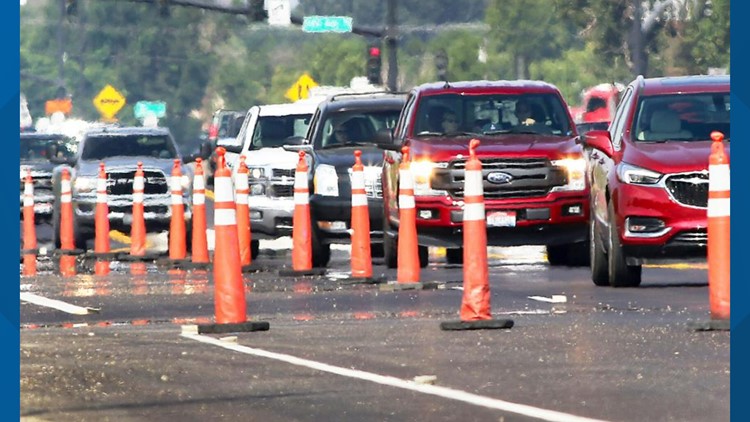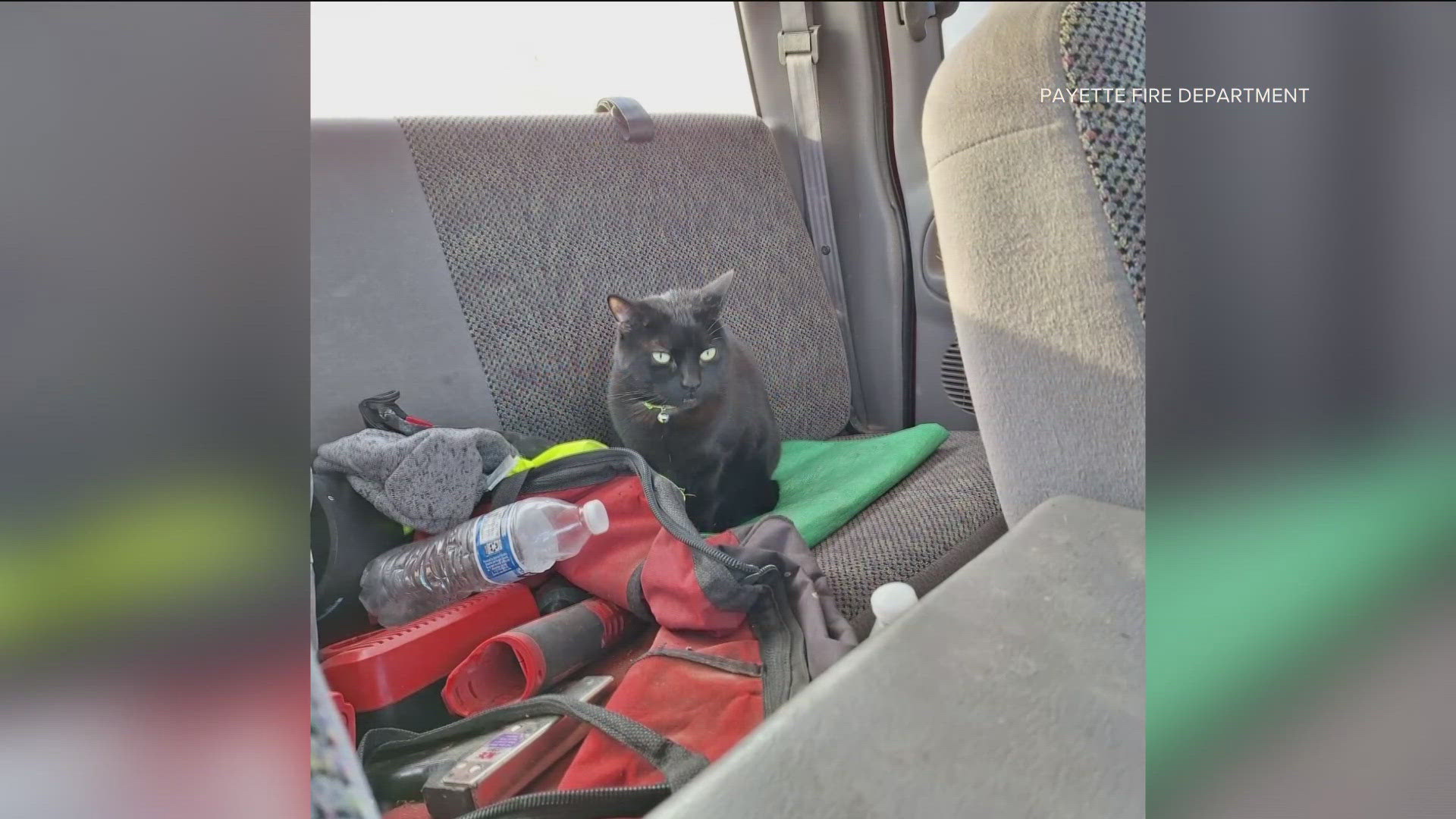IDAHO, USA — This article first appeared in the Idaho Press.
Most human beings hate driving.
Studies show the key to happiness may just be a short commute. And by extension, drivers hate anything that adds to traffic and makes the Treasure Valley more congested.
But does high-density development add to traffic? In fact, it can actually do the exact opposite — if done right.
“The way we should be growing is in a manner such that more and more people don't have to drive so much,” Boise Director of Planning and Development Services Tim Keane said. “And the only way to do that is to put density in the right places, I mean, where density is helpful.”
The “right places” part is key. Density has to be near things. If you build apartments in a location where no one can walk to do anything, such as an arterial interchange, people still have to drive to places like the grocery store.
But if you build apartments near grocery stores and parks and restaurants, people can walk or drive shorter distances.
Take Downtown Boise, for example. If someone lived downtown they could walk to get groceries at Trader Joe’s or WinCo. They could also walk to places like Fork or St. Luke’s and wouldn’t add their car to the many on the road. Or if they did drive, it would only be for a short distance versus driving all the way into downtown from West Boise, for example.
“If the average household in Boise wasn't creating 10 car trips a day, rather was creating seven or six, that's real progress,” Keane said. “If we go in the other direction, and it's just like, just spread it out, haphazardly, and everybody has to drive, your number will probably go from 10 to 12.”
Los Angeles is perhaps one of the best examples of urban sprawl leading to congestion.
One reality TV personality once said, “In L.A., I don't really want to go out because traffic sucks so bad. I'm sorry, I'm not going to spend five hours a day in my car.” And the website Thrillist compiled a list of 11 “quintessential” quotes about California traffic.
It also helps at the same time to work on improving public transportation. Keane said the city is investing in bus service in different parts of Boise.
For Keane, this is an exciting time. It can often be very hard to undo the damage, for example, in cities like Los Angeles, Atlanta and Phoenix. Boise has a chance to get its planning right and avoid the mistake in the first place.
“We're all growing, so we're kind of forming what will be,” Keane said. “It's kind of hard when everything's set.”
Meridian Planning Division Manager Caleb Hood echoed similar thoughts. Density can absolutely cause congestion, but if there are good public transportation options and other uses in close proximity, you can have density without the congestion. Those mixed uses nearby could include doctor’s offices, public parks, entertainment places and jobs.
“Everyone has a car, two or three per family. And typically, you're the only one in that car. So you've got single-occupancy vehicles running around everywhere. And that's what causes the congestion,” Hood said.
But traffic can be a big issue for many residents in the Treasure Valley.
For example, many in Meridian opposed a recent proposed 235-unit multi-family project called Bridgetower, in part because of concerns about the roads.
"We can all agree Meridian (is) growing way too fast," Jon Lauderdale wrote to the city in October. "The amount (of) traffic on McMillan (Road) is already horrendous due to Walmart/Costco and the continued expansion. The last thing we need is apartments."
Another resident, Megan Ratzesberger, wrote that the there is a lack of infrastructure, including roads, to support more people.
"There is already a new apartment complex being finished up near Costco that will be bringing a ton of new traffic with it!" Ratzesberger wrote in November. "Traffic in this town is too bad already, & infrastructure HAS to catch up BEFORE we keep allowing more people to plug up the roads."
Another, Jorge Grajeda, wrote that an influx of apartment residents will cause "major traffic congestion."
Any growth will add car trips. But density done right will add fewer car trips.
Public transportation options can also make a difference. In places like New York City, plenty of people don’t own cars, Hood said, although New York is not Idaho.
“In Meridian right now, you'd be hard pressed to live, quite frankly, without owning a car, especially when it's 8 degrees out,” Hood said.
But to get public transportation, there’s somewhat of a chicken and egg problem. You can’t run a bus without people to ride the bus, Hood said.
So there needs to be higher density first. People move in over time and build up the households that can support the transportation network, Hood said.
“You almost have to create a little bit of a headache first,” Hood said. “Ideally, they both come online just simultaneously right at the same time, but that's not how it works.”
The same thing could happen with different uses. No one builds a grocery store in the middle of nowhere and waits for people to come.
Meridian does want to see some roadway improvements happen. However, if a city just keeps widening freeways, Hood said, it just induces the demand because people see there’s an extra lane and then drive more.
The goal is for some areas in Meridian to be dense but with nearby mixed uses, Hood said.
Meridian is still “pretty family-friendly,” Hood said, so plenty of people will still need a car to get kids to soccer practice. But for those who aren’t living that lifestyle, the ideal situation is to have a mix of options.
“I don't think anyone likes to be stuck in traffic or have congestion problems and the frustration that goes along with that,” Hood said. “We want to see people spending more time with their families and doing things they want.”
Density isn’t the only thing that can contribute to congestion. Weather, construction, accidents and bottlenecks can all contribute to traffic, Community Planning Association of Southwest Idaho Principal Planner Hunter Mulhall said.
There are ways to help the situation, but there is no magic bullet. For example, additional roadway capacity in certain areas, increasing roadway patrols on the interstate to help clear crashes or disabled vehicles and building out bicycle and sidewalk infrastructure as well as expanding public transit. Technology can also give people more real-time conditions.
“I don't think we're ever going to get rid of congestion,” Mulhall said. “The idea is to manage it and we’ve talked more in terms of making travel more reliable for people. ... I think that's something that we're going to have to learn to accept.”
Watch more Local News:
See the latest news from around the Treasure Valley and the Gem State in our YouTube playlist:



